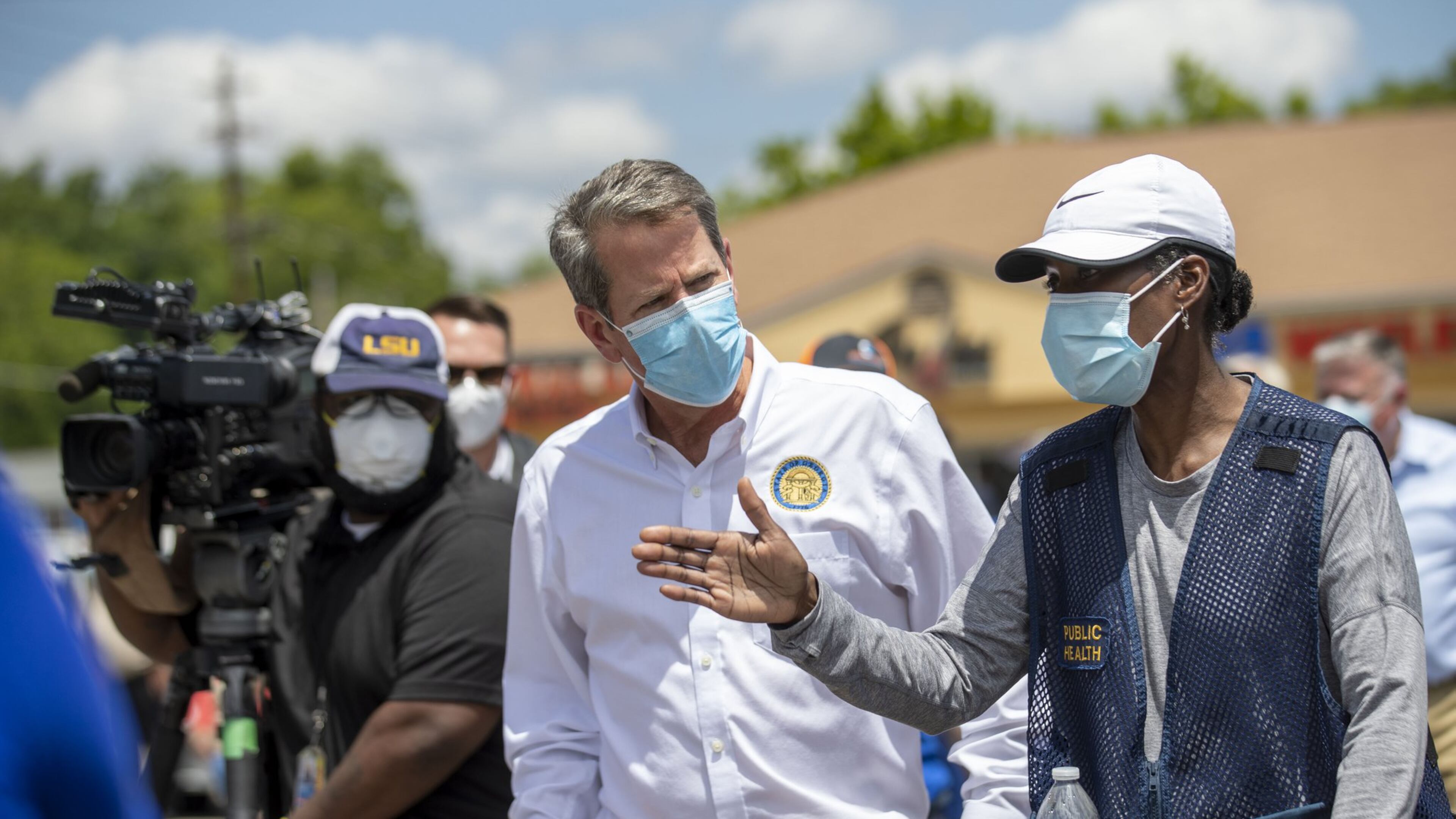A look at major coronavirus developments over the past week

Gov. Brian Kemp has ordered a review of how the state is reporting coronavirus figures. At the same time, he pleaded for patience as public health officials try to address a string of missteps that raised questions about how the state is presenting the latest data about the outbreak.
Meanwhile, Georgia has a new COVID-19 hot spot: Hancock County, 100 miles or more from the outbreaks at Albany and Gainesville; the state’s unemployment rate reached an all-time high of 11.9% in April; and Vice President Mike Pence visited Atlanta on Friday.
Here’s a look at major developments over the past week related to COVID-19.
Kemp orders review of coronavirus data
Responding to questions about mistakes in reporting data on the state public health website, Kemp said pressure to quickly update the information likely has contributed to the errors.
“We’re not perfect. We make mistakes,” he said.
He said his goal is to be transparent and have the correct data on the website. “And if we don’t, we’re going to own that. We’re going to tell people what happened. We’re going to get it fixed. And we’re going to keep moving on.”
The state’s public health commissioner, Dr. Kathleen Toomey, said she’s also implemented new protocols to screen for errors in coronavirus figures before they’re posted.
The governor’s remarks came as the state’s problems reporting COVID-19 data have made leaders the target of ridicule – and sparked criticism from Democrats. Some public health experts have questioned whether Kemp’s office is distorting the numbers to paint a sunnier picture of the success of the state’s coronavirus approach.
» COMPLETE COVERAGE: Coronavirus in Georgia

Vice President Pence discusses pandemic strategy
Pence said Georgia is setting “an example to the nation” by being among the first and most aggressive to restart its economy while staying mindful of public health guidelines.
“In a very real sense, I think history will record that Georgia helped lead the way back to a prosperous American economy,” Pence told reporters Friday after a barbecue lunch with the governor and first lady Marty Kemp at Star Cafe near Atlanta’s Westside.
The vice president praised Kemp, who came under fire for his decision to lift pandemic restrictions, and Georgia restaurant owners who have reopened their establishments.
It marked Kemp’s first in-person meeting with Pence since President Donald Trump strongly criticized the governor for rolling back coronavirus restrictions in late April.
Hours before the rebuke, Trump and Pence had both separately voiced support for plans to let some shuttered businesses, such as barber shops and tattoo parlors, reopen if they follow guidelines.

» FROM APRIL: Time will tell the toll on Georgia schools closed for coronavirus
» MORE: Vast changes may be needed in schools, day cares to avoid the spread of COVID-19
Health officials confirm mystery illness in nine Georgia children
Nine children in Georgia are now confirmed to have been ill with a mysterious new condition that’s likely linked to COVID-19, according to the state’s Department of Public Health.
The DPH is continuing to review the cases of about half a dozen other children who might have MIS-C, or Multisystem Inflammatory Syndrome in Children, as it was recently named by the Centers for Disease Control and Prevention.
Though considered rare, state officials expect more MIS-C diagnoses in the coming days as more medical professionals become aware of the syndrome and steps are being taken to better track the illness.
The symptoms include prolonged fever, lasting four or more days; very red eyes; a rash spread across the body; reddening or peeling on palms and soles of feet; abdominal pain; and vomiting or diarrhea.
While the exact cause of the condition — and any link to COVID-19 — is not yet clear, experts believe the coronavirus may trigger the immune system to overreact and cause widespread inflammation throughout the body.
In general, children have much milder COVID-19 infections than adults, with some not even showing symptoms.
» MORE: CDC probing mysterious illness in 15 children

COVID-19 hits another rural Georgia county hard
With just 8,500 people, Hancock had 170 reported cases of COVID-19 as of Wednesday, the fourth-highest number per capita in the state. On Tuesday, a Hancock nursing home reported 14 new deaths to the state public health department, bringing the county total to at least 19.
Hancock is a microcosm of where the disease hunts: The county is lower-income and overwhelmingly African American; it contains two nursing homes with poor ratings and one prison.

Georgia jobless rate skyrockets
Georgia’s unemployment rate reached an all-time high of 11.9% in April, and the flood of jobless claims unleashed by the coronavirus has continued in May, the Department of Labor said Thursday.
The state economy lost 492,100 jobs – more than one of every 10 positions – last month, by far the worst month on record. About 580,000 Georgians were officially jobless, more than during the weakest labor market in the wake of the Great Recession.
And May is shaping up as another historically bad month, despite government efforts to reopen the economy
Georgia begins planning for school in the fall
Georgia’s top government and educational leaders formed working groups to plan for reopening schools in the fall as the federal government released long-awaited safety guidance.
The 72 members on the K-12 “restart” working groups appointed by Kemp and state school Superintendent Richard Woods include current and past teachers of the year, rural and suburban metro Atlanta school superintendents (Coweta and Fayette counties), administrators from Fulton County Schools, public health officials, education organization leaders and state agencies.
Georgia’s 180 school districts will make their own decisions about whether and how to reopen their school buildings, absent a mandate from Kemp. The new group will provide expertise and perspective in six areas: school meals, distance learning and teacher training, mental health and wellness, supplemental learning, facilities and busing, and access to the internet and computing devices.
Staff writers Greg Bluestein,Kristal Dixon, Michael E. Kanell, Ty Tagami, Ariel Hart and Willoughby Mariano contributed to this article.


